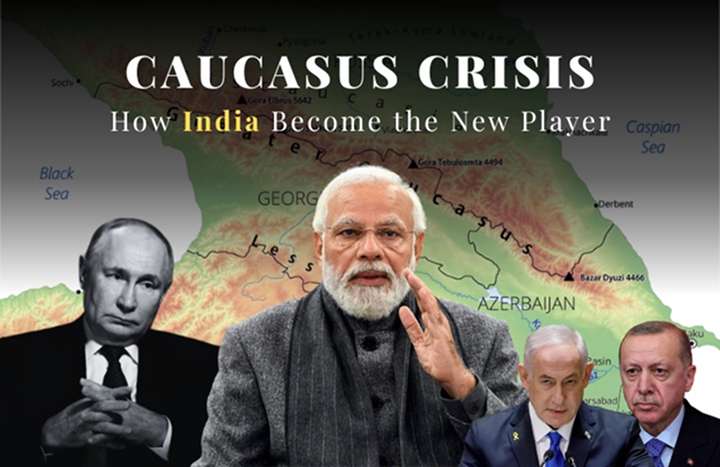The Caucasus is situated in a bubble of a changing geopolitical landscape that is quickly rising in a crisis of potential stretched across the Eurasia region. The Caucasus has been considered as part of the Russian sphere of influence for some time, but Russia’s power, mostly because of its time fighting the war in Ukraine, has weakened to the point where it is losing significant power in the corresponding region. And just as China and Turkey have stepped into that vacuum, India has also quietly appeared with somewhere promising to be a new significant element of the changing environment.
Azerbaijan has broken a path around Moscow’s authority By far the most notable of trend setter spurring the storm is Azerbaijan. No country has so publicly discarded the Russian hand cuffs than Azerbaijan. The area that we now recognize as Azerbaijan has been ruled by the Russian Empire in the 1800’s and jointly in the Soviet Union from as early as 1920 to as late as 1991 when Azerbaijan experienced its independence as the Soviet Union broke up. Azerbaijan was recently a member of the Russian led Collective Security Treaty Organization (CSTO) and withdrew its participation in 1999 citing that Russia had not taken any action during the regional conflict, First Nagorno-Karabakh War, of the region.
The recent dramatic shift can be traced to specific incidents. In November 2024, a Russian forces’ mistaken downing of an Azerbaijani passenger plane, killing dozens, provoked widespread outrage in Baku, as Moscow failed to issue a clear apology. This led to Azerbaijan retaliating economically by grounding Russian aircraft and suspending trade agreements. Tensions further escalated in June 2025 after two Azerbaijani citizens died under suspicious circumstances in Russian custody, reportedly tortured. In response, Azerbaijan launched a political counteroffensive, arresting Russian media personnel, shutting down the Sputnik news agency (reportedly a Russian intelligence hub), and closing Russian cultural centers across the country.
Over the past few years, Azerbaijan has strategically built strong security and strategic ties with Israel, Turkey, and the United States. This diversification has allowed Baku to become less reliant on Moscow and far more assertive in pursuing its own regional goals. Notably, during the 2020 and 2023 wars with Armenia, Azerbaijan utilized advanced drones and equipment primarily from Turkey and Israel, rather than Russia. In 2023, with Russia distracted by Ukraine, Azerbaijan launched a final operation to reclaim full control over Nagorno-Karabakh and even ordered Russian peacekeepers out, marking a major setback for the Kremlin. Furthermore, Baku began sending aid to Ukraine, a clear break from its historical ties with Russia. Backed by these new partnerships, Azerbaijan is now becoming a regional power in its own right, leveraging its energy exports and military modernization to reshape the Caucasus.
Armenia’s Disillusionment and Pivot The decline of Russian influence is also evident in Armenia, traditionally a close ally and CSTO member. Armenia has grown increasingly disgruntled with Russia’s inaction, particularly its failure to intervene on Armenia’s behalf in past wars against Azerbaijan or provide collective security guarantees. Moscow, in fact, supplied weapons to both sides in the Nagorno-Karabakh conflict, asserting itself as a neutral player while keeping the balance of power in its favor.
As a result, Armenia is quietly exiting the Russian orbit. Yerevan has distanced itself from the CSTO and has begun constructing its own new security ecosystem. This pivot includes building stronger ties with countries like India, France, and Greece, while also aiming to normalize relations with Azerbaijan.
- Top Defense Supplier: India has become Armenia’s top defense supplier, surpassing even France.
- Supporting Regional Integration: India supports deeper regional integration through the International North-South Transport Corridor (INSTC). Currently, the INSTC passes through Azerbaijan, but India is pushing to include Armenia in the INSTC, aiming to diversify routes and reduce dependency on any single player. This strategic positioning allows India to gain from both potential conflict and peace in the region
- Strategic Partnerships: India is working alongside France and Greece, two countries with their own strategic interests in balancing Turkey and Russia. With its good relations with Russia, India is becoming an influential stabilizer in the Caucasus.
A New Eurasian Architecture The developments in the Caucasus signal a shifting Eurasian chessboard, where the region is no longer Russia’s uncontested backyard. Azerbaijan’s rise, backed by Turkey, Israel, and the United States, alongside growing European energy partnerships, signifies a new geopolitical and geoeconomic order. The implications are profound, not just for Russia and Iran, but also for the Middle East, Europe, and India. As Russia’s dominance fades, what rises in its place, including the growing influence of India alongside Turkey, Israel, the EU, and the US, will ultimately shape the future of Eurasia. These stakeholders all have a vested interest in ensuring that the region remains stable yet strategically pluralistic.
Frequently Asked Questions (FAQ’s):
- Why is Azerbaijan distancing itself from Russia?
Azerbaijan has grown disillusioned with Russia due to Moscow’s inaction in past conflicts, a series of recent diplomatic and security incidents, and its desire to strengthen ties with countries like Turkey, Israel, and the United States - What role is India playing in the Caucasus?
India has emerged as Armenia’s top defense supplier, is pushing for Armenia’s inclusion in the International North-South Transport Corridor (INSTC), and is working with France and Greece to balance regional power dynamics. - How is Russia’s influence in the Caucasus changing?
Russia’s focus on the Ukraine war and its inability to maintain dominance in the region have allowed countries like Azerbaijan, Armenia, Turkey, and India to reshape the balance of power in the Caucasus

